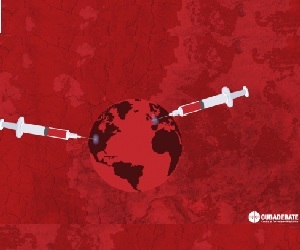 By Randy Alonso Falcón, director de Cubadebate
By Randy Alonso Falcón, director de Cubadebate
The apprehensions raised in some countries by the AstraZeneca/Oxford vaccine, the US dirty campaign against the Russian Sputnik V and the confirmed refusal of the most powerful nations to let their pharmaceutical companies temporarily release the patents of their antidotes against COVID-19, have further strained the availability of vaccines and deepened the profound differences in the right to life between the powerful and the poor in this world.
Never before has a health emergency struck so many in so many places and in such a short space of time. COVID-19 has already affected more than 120 million people in the world and has caused the death of more than 2.6 million human beings.
Such a universal challenge warranted a global and coordinated response. But once again, in addition to the demands of the UN and the World Health Organization, nationalism, pettiness, the overwhelming power of transnational corporations and every person for themselves, have prevailed.
Vaccines seem to be the only effective barriers against the pandemic. Only a majority immunization of the world’s population could put a stop to the growing transmission of the SARS-CoV-2 virus. But neither the pharmaceutical transnationals nor the governments of the rich world have that vocation for collective response and global solidarity.
Who can develop and produce vaccines?
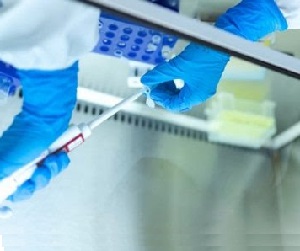
The pharmaceutical and biotechnology industry suffers from high concentration and transnationalization. Large companies from developed countries and emerging economies monopolize drug research, production and distribution. Nine of them are among the 100 companies that generate the highest revenues worldwide.
According to Euromonitor Global, the pharmaceutical industry is responsible for almost 4% of global production activity. If it were a country, it would be among the 15 richest economies on the planet. Almost half of the sector’s total sales come from China and the USA, followed by Switzerland, Japan, Germany and France.
The production of vaccines, in particular, concentrates in 4 large firms more than 80% of the market, according to 2019 data: the British GlaxoSmithKline, the American Merck Sharp & Dohme and Pfizer, and the French Sanofi.
That global market generated in 2018 some $37 billion and it is estimated that by 2027 it will exceed 6$4.5 billion.
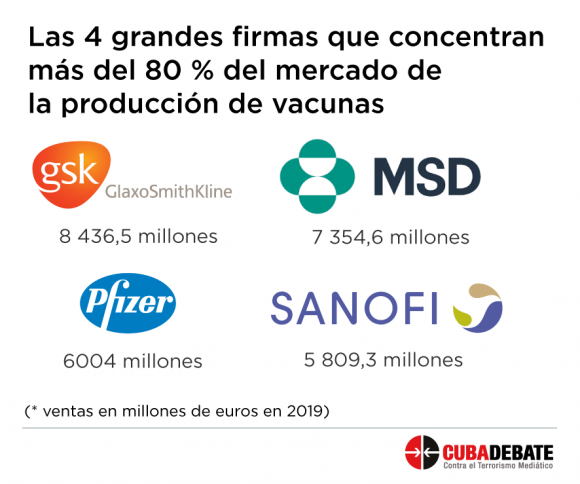
As is remarkable, underdeveloped nations -which are the vast majority-, have hardly any capacity to develop their own vaccines (Cuba is one of the few honorable exceptions) and no productive capacities of their own. This has left them with little room for maneuver to influence the uneven development of vaccines in the midst of the pandemic.
How have the vaccines against COVID-19 been financed?
Since the WHO declared COVID-19 a pandemic on March 11, it has been calling for a concerted and joint solution to the threat. But the wrathful logic of the market dictates the course of our world and what has taken place since then is a frantic race to hit the bull’s eye (immune and financial), in which there has been no shortage of obstacles, pressures and even blackmail.
From the outset, the major powers allied themselves with the major pharmaceutical corporations in order to conveniently manage the discovery of a solution that would allow them to emerge with an advantage from the health and economic crisis ravaging the world.
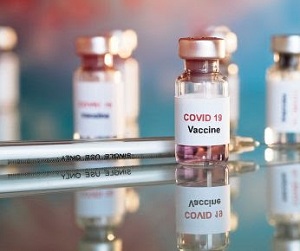 Governments provided at least $8.6 billion for vaccine development, according to analyst firm Airfinity. The US, EU and UK invested billions in AstraZeneca’s vaccine, developed by Oxford University. Germany invested $445 million in the vaccine developed by Pfizer and its German partner, BioNTech. Moderna’s vaccine was fully funded and co-produced by the U.S. government.
Governments provided at least $8.6 billion for vaccine development, according to analyst firm Airfinity. The US, EU and UK invested billions in AstraZeneca’s vaccine, developed by Oxford University. Germany invested $445 million in the vaccine developed by Pfizer and its German partner, BioNTech. Moderna’s vaccine was fully funded and co-produced by the U.S. government.
While philanthropic organizations contributed $1.9 billion. Individual personalities such as Bill Gates, Alibaba founder Jack Ma and country music star Dolly Parton made contributions.
Only $3.4 billion has come from the pharma companies’ own investment, part of which has also come from external funding.
Despite the fact that Big Pharma has only provided one third of the funding, who is reaping the economic benefits? Who has set the rules of the game in the distribution of vaccines?
Foul Play
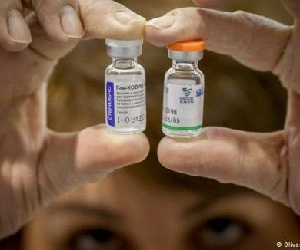 To obtain the vaccine against COVID became, beyond the health interest, a geopolitical objective. Whoever managed to get the vaccine would capitalize on its commoditization and whoever had more financial resources would be able to monopolize more immunizations.
To obtain the vaccine against COVID became, beyond the health interest, a geopolitical objective. Whoever managed to get the vaccine would capitalize on its commoditization and whoever had more financial resources would be able to monopolize more immunizations.
Scandalous was the news of the Trump administration’s maneuver, as early as March 2020, for the German company CureVac -which had begun to research a possible vaccine-, to leave its headquarters in the European country and move to the U.S. in exchange for “large amounts of money”.
As it had also acquired PCR tests, pulmonary ventilators, masks and biosafety equipment, Washington also set out from the beginning to acquire the production and distribution of vaccines.
This was coupled with sometimes subtle, sometimes overt, smear campaigns against Russian and Chinese vaccine candidates in a concerted attempt to shut them out of other markets. Many doubts were cast on the speed of development, quality of clinical trials and effectiveness of the candidates from both nations, especially against Sputnik V from Gamaleya Laboratories.
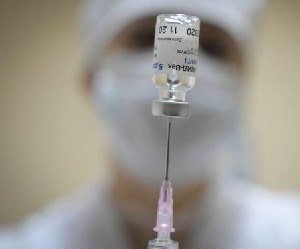 A nurse prepares a Sputnik V injection at a Moscow clinic. Photo: AFP
A nurse prepares a Sputnik V injection at a Moscow clinic. Photo: AFP
After Russia’s leading vaccine was certified by its authorities and sparked interest in several nations, the United States and the European Union have been tripping it up all over the place. The 2020 Annual Report of the U.S. Department of Health and Human Services (HHS) recently revealed that the U.S. Department of Health and Human Services (HHS) recently revealed that the Office of Global Affairs (OGA) used the Office of the Health Attaché in Brazil to persuade the government of that South American country to “reject the Russian COVID-19 vaccine”.
Text subtitled as Combating malign influences in the Americas. Photo Screenshot of HSS annual report
In response to the revelation, Russian presidential spokesman Dimity Peskov stated: “In many countries, the scale of pressure is unprecedented (…) such selfish attempts to force countries to abandon some vaccines lack perspective. We believe that there should be as many doses of vaccines as possible so that all countries, including the poorest, have a chance to stop the pandemic.”
The European Union, for its part, has not yet given the green light to the Russian vaccine for use in its member countries, even though that region has lagged behind the US, Canada, the UK and Israel in vaccine availability, and even though the prestigious health journal The Lancet acknowledged the high efficacy of Sputnik V in a publication.
Beyond such barriers, Russian and Chinese vaccines have been gaining ground in different regions, due to their effectiveness and the global shortage of immunizers. Slovakia even left the European Union fold to acquire 2 million doses of Sputnik V and Hungary, which has also approved the use of the Russian vaccine, acquired doses of the Chinese Sinopharm, which has also not received the green light from the European Medicines Agency.
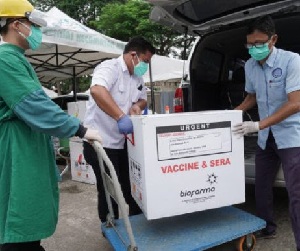 Health workers in Indonesia unload a shipment of Chinese vaccine Sinovac
Health workers in Indonesia unload a shipment of Chinese vaccine Sinovac
Blackmail without anesthesia
The States made the major investment, but BigPharma imposes the conditions and keeps the revenues. The monopoly of a few multinationals in the procurement and production of anti-COVID-19 vaccines gives such companies overwhelming power.
Recent reports show how pharmaceutical giant Pfizer has attempted to impose onerous conditions on Latin American nations to supply them with certain quantities of its injectable.
Brazilian President Jair Bolsonaro showed his displeasure these days at Pfizer’s demands on his government, pointing out that among the conditions set by the consortium is a clause in the purchase contract that exempts it from “all liability” for possible side effects of its immunizer.
“We have been very hard and they have been very hard on us. They won’t change a comma. The government is dealing with this together with Congress and it is being discussed in terms of a relaxation of the law”, said the recently dismissed Brazilian Minister of Health, Army General Eduardo Pazuello.
Argentina, Peru and the Dominican Republic also suffered intense pressure from Pfizer, as shown in an investigation by The Bureau Investigative Journalism.
Pfizer representatives in Buenos Aires demanded indemnification against any civil claims citizens might file if they experienced adverse effects after being vaccinated. “We offered to pay for millions of doses upfront, we accepted this international insurance, but the last request was extraordinary: Pfizer demanded that Argentina’s sovereign assets also be part of the legal backing,” an Argentine official confessed. “It was an extreme demand that I had only heard when the foreign debt had to be negotiated, but in that case as in this one, we rejected it immediately.”
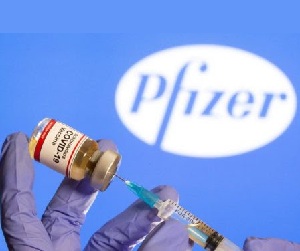 The Argentine government believes that Pfizer’s demands were part of a commercial strategy that favored sales to developed countries and not to Latin American countries.
The Argentine government believes that Pfizer’s demands were part of a commercial strategy that favored sales to developed countries and not to Latin American countries.
There are several voices that warn that the urgency to have vaccines available for a disease that has left so many dead in the world may have led some governments to accept significant limitations on their responsibilities and demand transparency on the agreements with pharmaceutical companies.
Professor Lawrence Gostin, director of the World Health Organization’s Collaborating Center for National and Global Health Law said, “Pharmaceutical companies should not use their power to limit life-saving vaccines in low- and middle-income countries” and noted that liability protection should not be used as “the sword of Damocles hanging over the heads of desperate countries with desperate populations”.
Even mighty Europe seems to have felt the pressures. Although EU agreements with vaccine manufacturers are kept with their main clauses secret, the Vaccine Procurement Strategy made public by the European Commission states that “the responsibility for the development and use of the vaccine, including any specific compensation required, will lie with the procuring Member States.”
Excerpt from the contract for the purchase of vaccines from CureVac by the European Commission was disclosed with all essential parts blacked out.
Who will be able to be vaccinated in 2021?
Vaccine production capacities in the world are insufficient to have the necessary doses this year to immunize the world’s population. The International Federation of Pharmaceutical Manufacturers and Associations (IFPMA) says that the estimated global demand for vaccines in 2021 is between 10 and 14 billion doses.
According to statistics cited by data firm Statista, the United States can produce nearly 4.7 billion doses of COVID-19 vaccine and India more than 3 billion potential doses. China, previously not a major player in the vaccine export market, has committed to manufacturing more than 1 billion doses.
Great Britain, Russia, Germany and South Korea are also among the established manufacturing centers, but with lower production capacity.
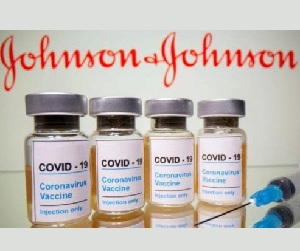 Vacuna Johnson & Johnson. Photo: Reuters.
Vacuna Johnson & Johnson. Photo: Reuters.
Given this reality, the inequity and injustice of today’s world are once again evident: the richest countries have purchased most of the vaccines that will be produced in 2021 (even for stockpiling), while poor nations will not have doses to administer even to their most vulnerable segments of the population. More than 100 nations are waiting for the first bulb to arrive.
It is estimated that 90% of the inhabitants of the nearly 70 lowest-income countries will not have the opportunity to be vaccinated against COVID-19 this year.
The most powerful nations took advantage of their purchasing power and investments in vaccine development to secure supplies of the coveted antidote.
So far, about 12.7 billion doses of various coronavirus vaccines have been pre-purchased, enough to vaccinate approximately 6.6 billion people (except for Johnson & Johnson’s, all vaccines approved so far require two doses).
More than half of those doses, 4.2 billion insured, with the option to buy another 2.5 billion, have been purchased by wealthy countries that are home to only 1.2 billion people.
Canada has bought enough doses to inoculate every Canadian five times, while the U.S., U.K., EU, EU, Australia, New Zealand and Chile have bought enough to vaccinate their citizens at least twice, although some of the vaccines have not yet been approved.
Israel struck a deal for 10 million doses and a promise of a steady supply from Pfizer in exchange for data on vaccine recipients. According to reports, the country also paid $30 per dose, double the price paid by the EU.
As Irene Bernal, a researcher on access to medicines at the NGO Salud por Derecho, told the newspaper El País last December, “we are seeing that whoever has the money is the one who has the access. We have kept 53% of the vaccines for 14% of the population, the rich. And the companies have a limited production capacity, so when are the doses going to reach the poorest countries?”
Low- and middle-income countries, with 84% of the world’s population, have made deals directly with pharmaceutical companies, but have so far secured only 32% of the supply.
“We are in such a massive crisis,” said Fatima Hassan, founder of the South African Health Justice Initiative. “If even in South Africa we can’t vaccinate half our population soon, I can’t even imagine how Zimbabwe, Lesotho, Namibia and the rest of Africa will cope. If this is going to go on for another three years, we won’t get any kind of continental or global immunity.”
Mexican President Andres Manuel Lopez Obrador and his Foreign Minister Marcelo Ebrard have asked the U.S. authorities to allow them to acquire part of the tens of millions of AstraZeneca vaccines produced in the United States, which Washington has stockpiled without having approved the use of this drug. Other countries that have already authorized this vaccine are begging to have them.
Mexico, one of the countries with the largest presence of COVID-19, has so far administered some 4.4 million doses using Pfizer, AstraZeneca, Sinovac and Sputnik V vaccines, in a population of more than 128 million inhabitants, which means a low vaccination rate, according to the website www.ourworldindata.org managed by the University of Oxford.
The most current statistics from this observatory show the low proportion and unequal distribution of the number of fully vaccinated people (with all the necessary doses) in the world:
Percentage of population fully vaccinated with required doses by country, March 16, 2021. Graphic: OurWorldinData /Oxford University
According to data collected by Bloomberg, as of Thursday, more than 410 million doses of anti-COVID vaccines have been administered worldwide in some 132 countries. This represents just 2.7% of the world’s population.